Your Best temperature to pour concrete slab images are available. Best temperature to pour concrete slab are a topic that is being searched for and liked by netizens now. You can Find and Download the Best temperature to pour concrete slab files here. Get all royalty-free photos.
If you’re looking for best temperature to pour concrete slab images information linked to the best temperature to pour concrete slab interest, you have pay a visit to the right blog. Our site frequently gives you suggestions for refferencing the maximum quality video and image content, please kindly surf and locate more enlightening video content and graphics that fit your interests.
Best Temperature To Pour Concrete Slab. The Best Type Of Cement For Concrete Slabs. In the world of concrete hot weather is more than just temperature. Concrete cures best in a range between 70 to 80 F but as your temperature approaches 90 F youll start to run into problems. It will set in slightly less than two hours at 100 degrees Fahrenheit but at 30 degrees Fahrenheit it will take 19 hours.
 Pouring Slab In Cold Weather Youtube From youtube.com
Pouring Slab In Cold Weather Youtube From youtube.com
Heated concrete mixes and cement blends intended for use in frigid environments also exist and are used in specialized cases. Planning for the cold weather concrete pour is complete. Today is concrete day. People use PPC to produce concrete for homes residential areas and schools. Concrete shouldnt be poured more than. Experts agree that the best temperature to pour concrete is between 50-60 F.
The Foolproof Concrete Strategy.
It will set in slightly less than two hours at 100 degrees Fahrenheit but at 30 degrees Fahrenheit it will take 19 hours. People use PPC to produce concrete for homes residential areas and schools. It will set in slightly less than two hours at 100 degrees Fahrenheit but at 30 degrees Fahrenheit it will take 19 hours. The Best Type Of Cement For Concrete Slabs. When temperatures dip below 40F the chemical reactions that strengthen concrete slow down and can lead to weaker concrete. Temperatures below 50F will begin to slow the curing process and the water in the cement is at risk of freezing at temperatures below 40F.
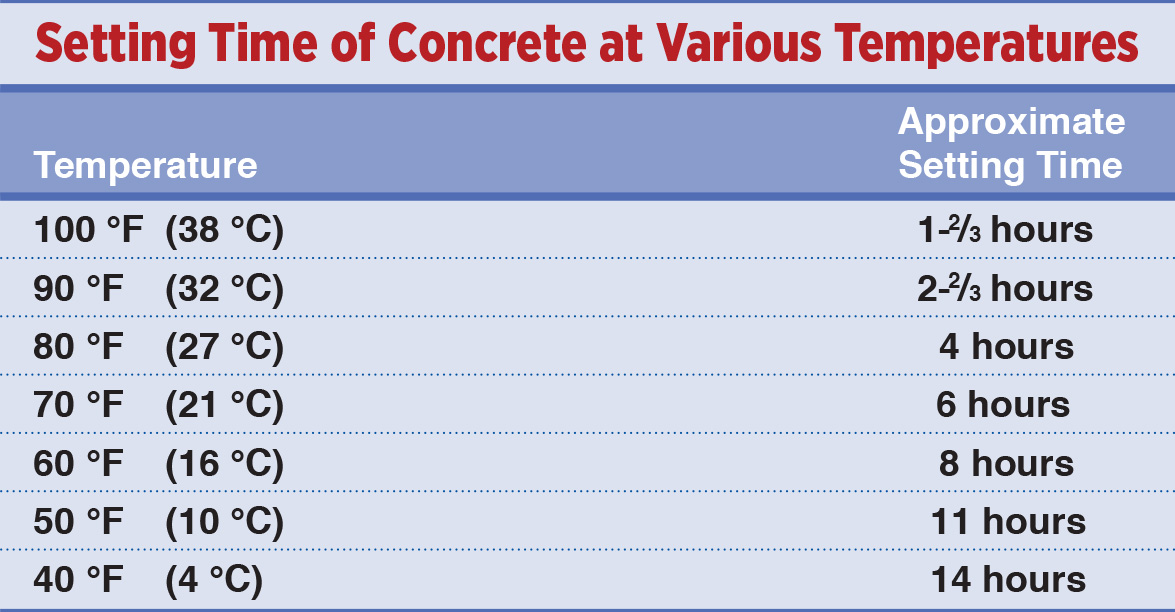 Source: news.whitecap.com
Source: news.whitecap.com
Today is concrete day. You can sometimes get a truck to pour concrete straight into your form. Different types of cement are used to construct concrete slabs but the best would be Portland Pozzolana Cement PPC. The necessary chemical reactions that set and strengthen concrete slow significantly below 50 F and are almost non-existent below 40 F. According to the Penn State University College of Engineering concrete will set in anywhere from about two to 19 hours depending on the temperature.
 Source: greenhomebuildaustralia.com
Source: greenhomebuildaustralia.com
It is helpful for works like waterproofing tiling brick. It is helpful for works like waterproofing tiling brick. On a bigger square slab such as for instance a patio you wish to consider breaking the concrete with joints that are perpendicular too down in addition to across. It will set in slightly less than two hours at 100 degrees Fahrenheit but at 30 degrees Fahrenheit it will take 19 hours. The ideal temperature range for pouring concrete is 40 to 60 degrees over a 24-hour period.
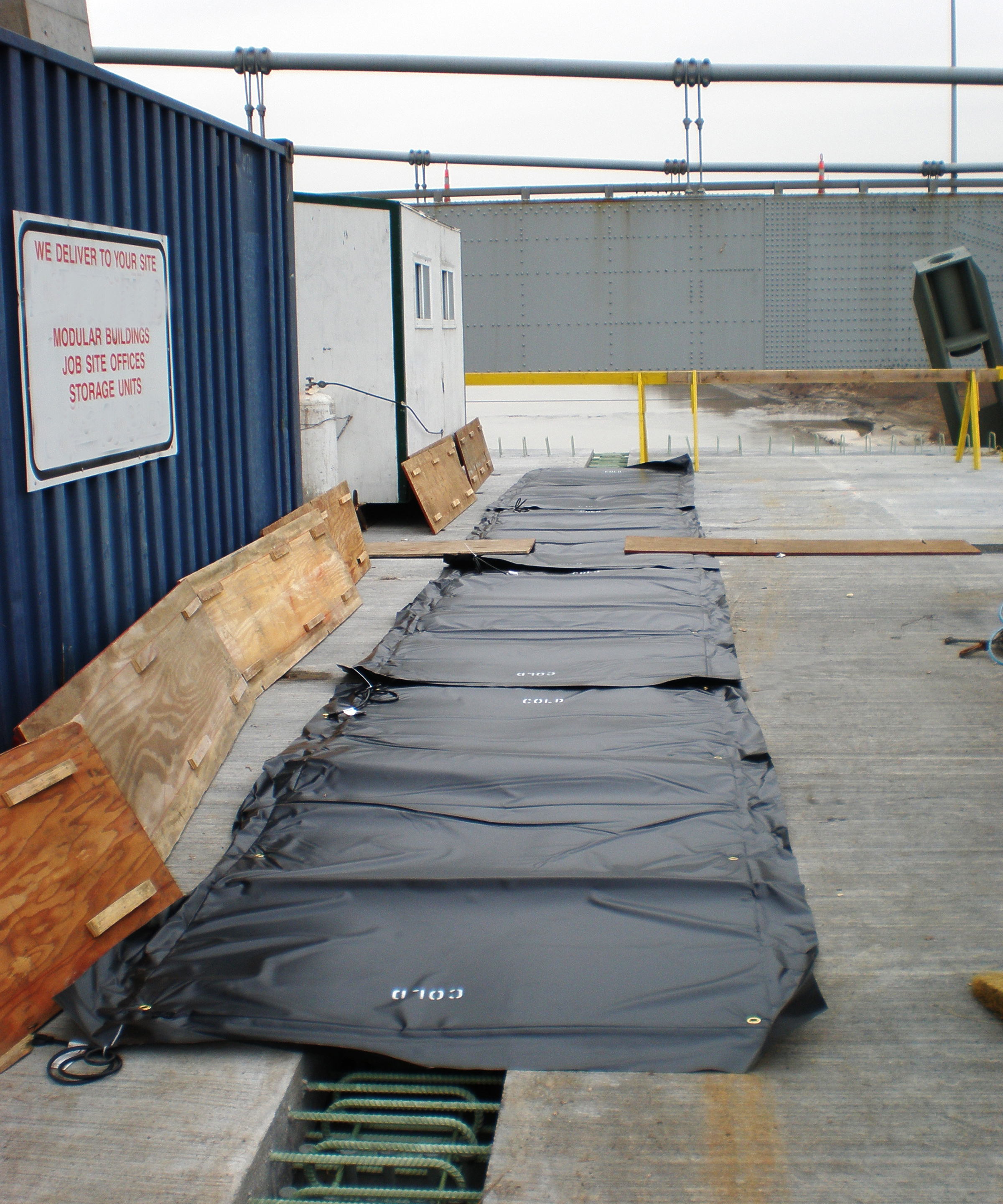 Source: powerblanket.com
Source: powerblanket.com
If young concrete is permitted to cool below the freezing point it can be damaged to such an extent that it is going to be unfit for use. Check the temperature the day before and on the day of your pour. The Foolproof Concrete Strategy. The ideal temperature range for pouring concrete is 40 to 60 degrees over a 24-hour period. The Ideal Temperature for Pouring Concrete.
 Source: wikiwand.com
Source: wikiwand.com
Because temperatures below 40 F for prolonged periods can affect concrete strength cold-weather concreting practices are the norm for exterior pours in the winter even though temperatures may never get cold enough for a hard freeze. The Foolproof Concrete Strategy. Due to extensive freeze-thaw conditions this region is prone to spalling and scaling concrete. The best temperatures for curing concrete are between 40 and 60 degrees Fahrenheit but some experts recommended letting the weather warm up to 50 degrees. Close to Freezing should be avoided and above 35 deg in hot areas.
 Source: youtube.com
Source: youtube.com
It is helpful for works like waterproofing tiling brick. PPC is made of cement clinker 77 gypsum 3-5 and fly-ash 20. Because temperatures below 40 F for prolonged periods can affect concrete strength cold-weather concreting practices are the norm for exterior pours in the winter even though temperatures may never get cold enough for a hard freeze. You can sometimes get a truck to pour concrete straight into your form. By 7 days the high-temperature cured concretes had no more strength than the 73 concrete or even less.
 Source: gra-rock.com
Source: gra-rock.com
PPC is made of cement clinker 77 gypsum 3-5 and fly-ash 20. Colder temperatures slow the process down and hotter ones speed it up. The necessary chemical reactions that set and strengthen concrete slow significantly below 50 F and are almost non-existent below 40 F. Between 40 and 60 allows the water to slowly evaporate from the concrete but is not cold enough to slow down the chemical process of curing. Experts agree that the best temperature to pour concrete is between 50-60 F.
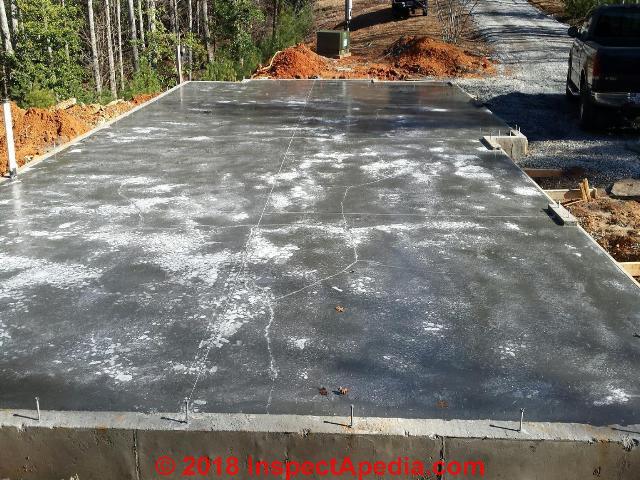 Source: inspectapedia.com
Source: inspectapedia.com
The necessary chemical reactions that set and strengthen concrete slow significantly below 50 F and are almost non-existent below 40 F. Proper mix design placement. Colder temperatures slow the process down and hotter ones speed it up. Heated concrete mixes and cement blends intended for use in frigid environments also exist and are used in specialized cases. Never allow concrete to be laid onto frozen ground ice or snow.
 Source: theconstructor.org
Source: theconstructor.org
Planning for the cold weather concrete pour is complete. Ice is added in the water to maintain the temperature below 37 deg. When temperatures dip below 40F the chemical reactions that strengthen concrete slow down and can lead to weaker concrete. PPC is made of cement clinker 77 gypsum 3-5 and fly-ash 20. Pour the concrete into the mold.
 Source: kitcheninfinity.com
Source: kitcheninfinity.com
In order to avoid these issues its advised to pour concrete at a temperature between 50 to 60F. Proper mix design placement. These can allow concrete to be poured at temperatures under 30 degrees Fahrenheit. Since weather is unpredictable and often uncooperative we need to be flexible and prepared to pour in the hot weather. You can sometimes get a truck to pour concrete straight into your form.
 Source: thespruce.com
Source: thespruce.com
Since weather is unpredictable and often uncooperative we need to be flexible and prepared to pour in the hot weather. According to the Penn State University College of Engineering concrete will set in anywhere from about two to 19 hours depending on the temperature. Due to extensive freeze-thaw conditions this region is prone to spalling and scaling concrete. In order to avoid these issues its advised to pour concrete at a temperature between 50 to 60F. In very extreme climates you may need additional heat sources to maintain the proper ambient temperature.
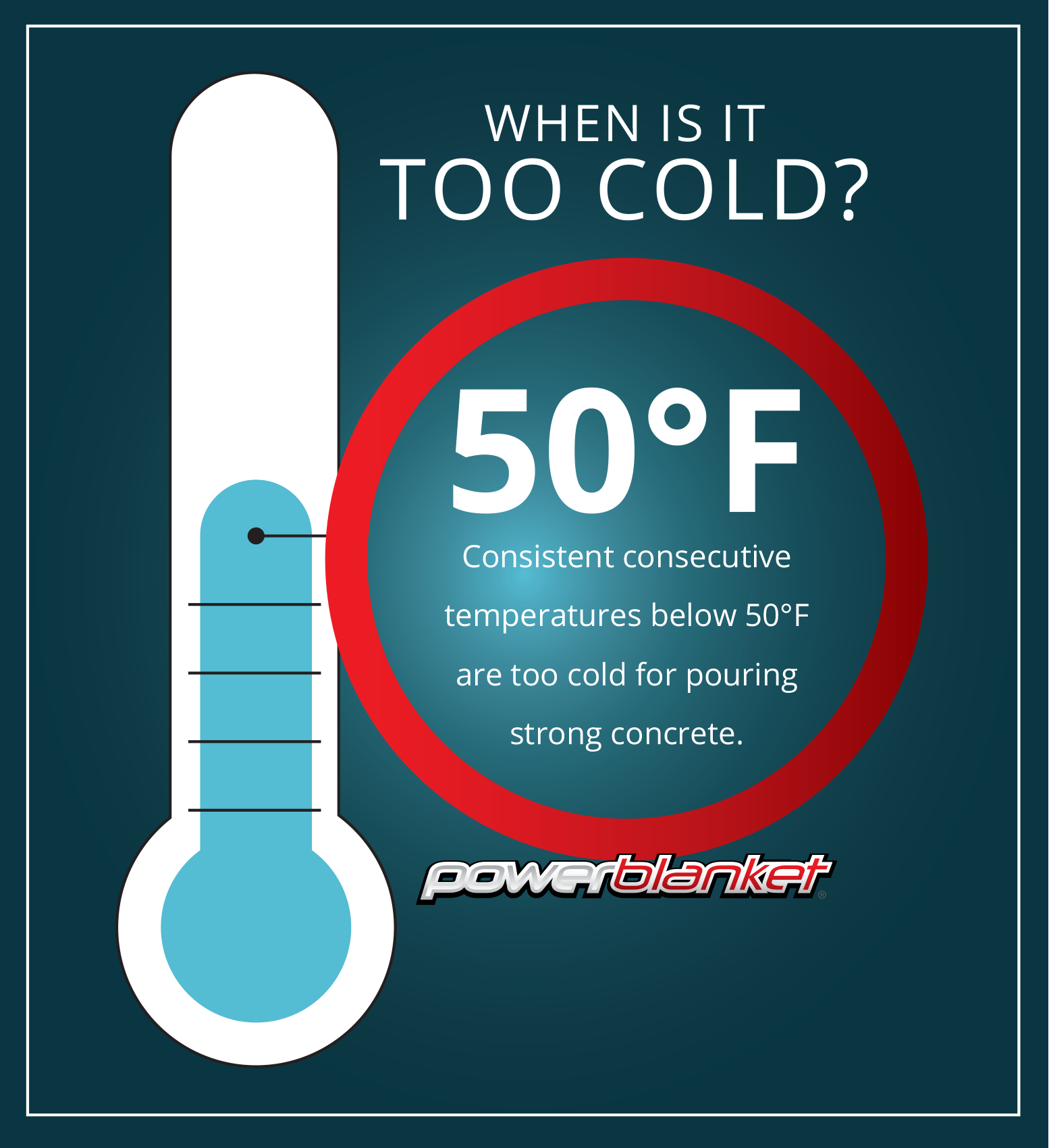 Source: powerblanket.com
Source: powerblanket.com
Experts agree that the best temperature to pour concrete is between 50-60 F. At an age of 1 day the 120F concrete was strongest and the 25F concrete was weakest. It will not set in temperatures as cold as 20 degrees Fahrenheit. Experts agree that the best temperature to pour concrete is between 50-60 F. The necessary chemical reactions that set and strengthen concrete slow significantly below 50 F and are almost non-existent below 40 F.
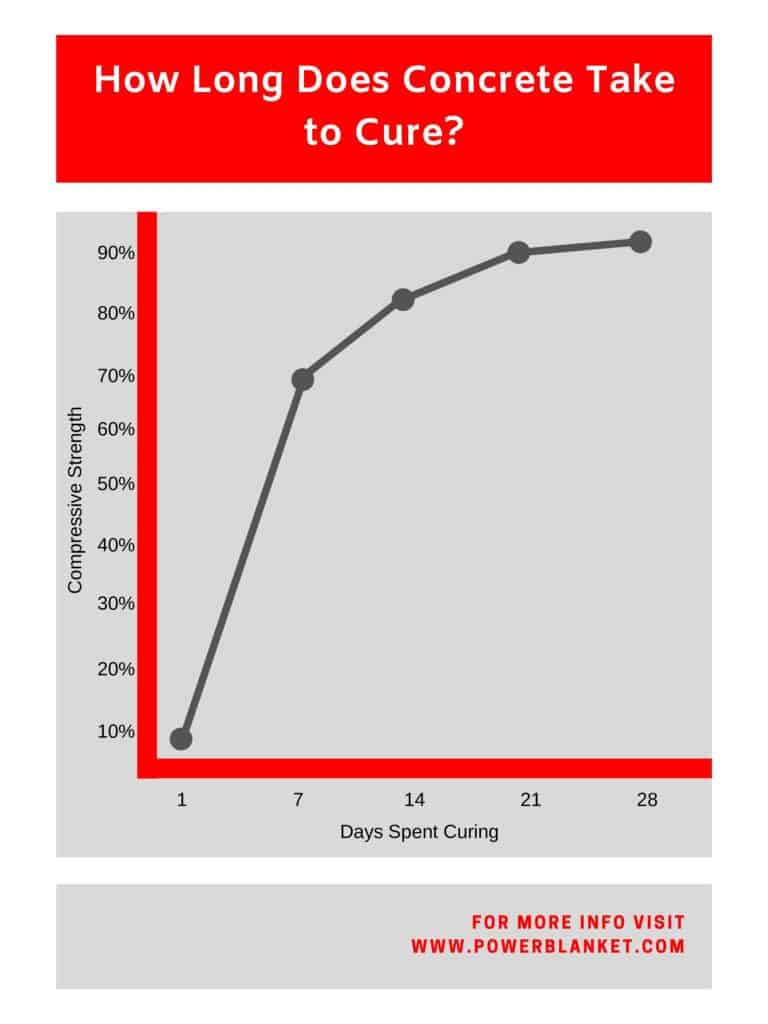 Source: powerblanket.com
Source: powerblanket.com
Proper mix design placement. Concrete cures best in a range between 70 to 80 F but as your temperature approaches 90 F youll start to run into problems. Proper mix design placement. Experts agree that the ideal temperature for pouring concrete is approximately 50- 60 Fahrenheit. Because temperatures below 40 F for prolonged periods can affect concrete strength cold-weather concreting practices are the norm for exterior pours in the winter even though temperatures may never get cold enough for a hard freeze.
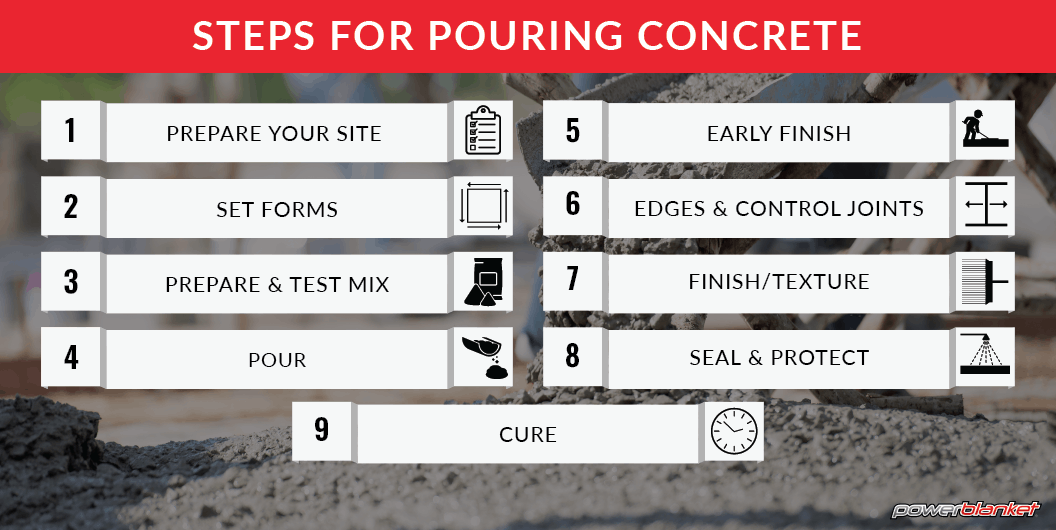 Source: powerblanket.com
Source: powerblanket.com
Planning for the cold weather concrete pour is complete. Experts agree that the best temperature to pour concrete is between 50-60 F. Colder temperatures slow the process down and hotter ones speed it up. These can allow concrete to be poured at temperatures under 30 degrees Fahrenheit. The range of ideal temperatures to pour concrete would be around 10 to 30 deg Centigrade.
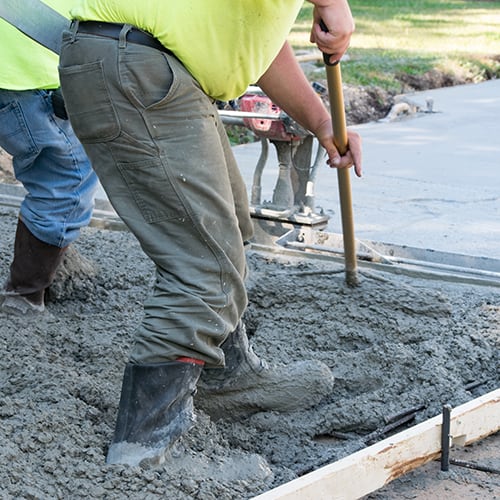 Source: powerblanket.com
Source: powerblanket.com
Otherwise load it into wheelbarrows and tilt them into the form until the. The Best Type Of Cement For Concrete Slabs. Proper mix design placement. PPC is made of cement clinker 77 gypsum 3-5 and fly-ash 20. Colder temperatures slow the process down and hotter ones speed it up.
 Source: uniquepavingmaterials.com
Source: uniquepavingmaterials.com
When temperatures dip below 40F the chemical reactions that strengthen concrete slow down and can lead to weaker concrete. Different types of cement are used to construct concrete slabs but the best would be Portland Pozzolana Cement PPC. The Best Type Of Cement For Concrete Slabs. Today is concrete day. In the world of concrete hot weather is more than just temperature.
 Source: mastermixconcrete.co.uk
Source: mastermixconcrete.co.uk
The range of ideal temperatures to pour concrete would be around 10 to 30 deg Centigrade. The Ideal Temperature for Pouring Concrete. Proper mix design placement. The range of ideal temperatures to pour concrete would be around 10 to 30 deg Centigrade. Blake Flournoy Blake Flournoy is a writer reporter and researcher based out of Baltimore MD.
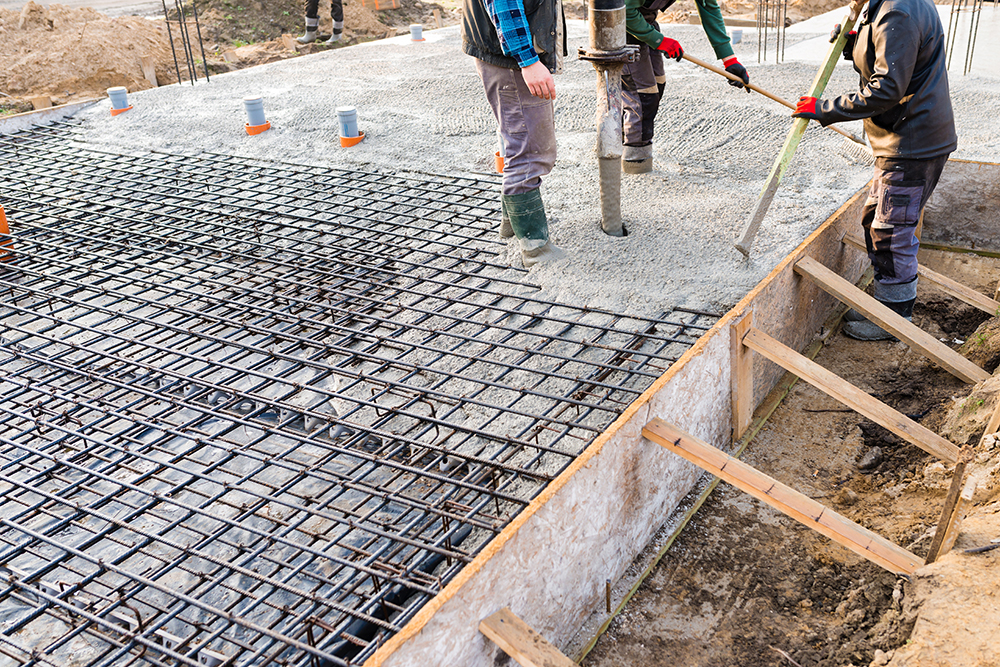 Source: akcp.com
Source: akcp.com
The ideal temperature range for pouring concrete is 40 to 60 degrees over a 24-hour period. The range of ideal temperatures to pour concrete would be around 10 to 30 deg Centigrade. Experts agree that the ideal temperature for pouring concrete is approximately 50- 60 Fahrenheit. Ice is added in the water to maintain the temperature below 37 deg. Temperatures below 50F will begin to slow the curing process and the water in the cement is at risk of freezing at temperatures below 40F.
 Source: resilver.com
Source: resilver.com
If temperatures are likely to be below 3C then make a plan to avoid complications. These can allow concrete to be poured at temperatures under 30 degrees Fahrenheit. According to the Penn State University College of Engineering concrete will set in anywhere from about two to 19 hours depending on the temperature. It will not set in temperatures as cold as 20 degrees Fahrenheit. On a bigger square slab such as for instance a patio you wish to consider breaking the concrete with joints that are perpendicular too down in addition to across.
This site is an open community for users to do sharing their favorite wallpapers on the internet, all images or pictures in this website are for personal wallpaper use only, it is stricly prohibited to use this wallpaper for commercial purposes, if you are the author and find this image is shared without your permission, please kindly raise a DMCA report to Us.
If you find this site convienient, please support us by sharing this posts to your own social media accounts like Facebook, Instagram and so on or you can also bookmark this blog page with the title best temperature to pour concrete slab by using Ctrl + D for devices a laptop with a Windows operating system or Command + D for laptops with an Apple operating system. If you use a smartphone, you can also use the drawer menu of the browser you are using. Whether it’s a Windows, Mac, iOS or Android operating system, you will still be able to bookmark this website.






